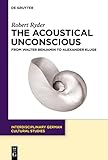The Acoustical Unconscious : From Walter Benjamin to Alexander Kluge / Robert Ryder.
Material type: TextSeries: Interdisciplinary German Cultural Studies ; 32Publisher: Berlin ; Boston : De Gruyter, [2022]Copyright date: ©2022Description: 1 online resource (X, 265 p.)Content type:
TextSeries: Interdisciplinary German Cultural Studies ; 32Publisher: Berlin ; Boston : De Gruyter, [2022]Copyright date: ©2022Description: 1 online resource (X, 265 p.)Content type: - 9783110737776
- 9783110733020
- 9783110733006
- 152.1/5 23
- BF251 .R93 2022
- BF251 .R93 2022
- online - DeGruyter
- Issued also in print.
| Item type | Current library | Call number | URL | Status | Notes | Barcode | |
|---|---|---|---|---|---|---|---|
 eBook
eBook
|
Biblioteca "Angelicum" Pont. Univ. S.Tommaso d'Aquino Nuvola online | online - DeGruyter (Browse shelf(Opens below)) | Online access | Not for loan (Accesso limitato) | Accesso per gli utenti autorizzati / Access for authorized users | (dgr)9783110733006 |
Browsing Biblioteca "Angelicum" Pont. Univ. S.Tommaso d'Aquino shelves, Shelving location: Nuvola online Close shelf browser (Hides shelf browser)

|

|

|

|

|

|

|
||
| online - DeGruyter Goethe medial : Aspekte einer vieldeutigen Beziehung / | online - DeGruyter Tabu und Toleranz : Der Umgang mit Homosexualität in der Bundeswehr 1955 bis 2000 / | online - DeGruyter Anti-Communist Solidarity : US-Brazilian Labor Relations During the Dictatorship in Cold-War Brazil (1964-1985) / | online - DeGruyter The Acoustical Unconscious : From Walter Benjamin to Alexander Kluge / | online - DeGruyter Architektenschmiede Paris : Die Karriere des Jakob Ignaz Hittorff / | online - DeGruyter Asia and the Secular : Francophone Perspectives in a Global Age / | online - DeGruyter Die Kreativität des Christentums : Von der Wahrnehmung zur Gestaltung der Welt / |
Frontmatter -- Acknowledgements -- Contents -- List of Abbreviations -- Introduction: Hearing Otherwise -- 1 Walter Benjamin’s Shell-Shock: Sounding the Acoustical Unconscious -- 2 Of Birds and Barks: Listening in on the Forgotten in Freud, Benjamin, and Tieck -- 3 Voices Carry: Benjamin and Arnheim on Radio -- 4 Glimpsing the World through Our Ears: Günter Eich and the Acoustical Unconscious -- 5 Clatter in Kracauer and Kluge: Politicizing the Acoustical Unconscious -- Conclusion: Toward a Genealogy of the Acoustical Unconscious -- Works Cited -- Index
restricted access online access with authorization star
http://purl.org/coar/access_right/c_16ec
Is there an acoustical equivalent to Walter Benjamin’s idea of the optical unconscious? In the 1930s, Benjamin was interested in how visual media expand our optical perception: the invention of the camera allowed us to see images and details that we could not consciously perceive before. This study argues that Benjamin was also concerned with how acoustical media allow us to “hear otherwise,” that is, to listen to sound structures previously lost to the naked ear. Crucially, they help sensitize us to the discursive sonority of words, which Benjamin was already alluding to in his autobiographical work. In five chapters that range in scope from Tieck’s Blonde Eckbert, which Benjamin once called his locus classicus of his theory of forgetting, to Alexander Kluge’s films and short texts, where he develops what he calls “sound perspectives,” this monograph discusses how the acoustical unconscious enriches our understanding of different media, from the written word to radio and film. As the first book-length study of Benjamin’s linguistic, cultural-historical, and media-theoretical reflections on sound, this book will be particularly relevant to students and scholars of both German studies and sound studies.
Issued also in print.
Mode of access: Internet via World Wide Web.
In English.
Description based on online resource; title from PDF title page (publisher's Web site, viewed 25. Jun 2024)


